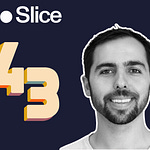Turner Novak’s multi-channel strategy isn’t about building his personal brand. It’s about creating distribution he can lend to his portfolio companies.
Most VCs treat media as a side project or ego exercise. Turner built Banana Capital differently. The memes on X/Twitter, the podcast (The Peel), the newsletter (The Split), they’re all top-of-funnel infrastructure designed to support founders.
“You’re building up distribution that you can lend to portfolio companies. There’s a lot of VCs who build their own personal brand and I think that’s actually falling short of what you could do.”
This isn’t abstract. When a portfolio company needs to hire, Turner’s already built the talent pipeline. When they need customer traction, he’s got the reach. When they’re fundraising their next round, he’s spent years making them look good in public. The distribution compounds for them, not just for him. “I tell founders... I’ve made myself look like an idiot on the internet for five years.” It’s not a joke, it’s infrastructure he’s built that his companies can leverage without having to build it themselves.
He recognized early that not everyone lives on X/Twitter. “Every person uses Reddit and YouTube or YouTube and X/Twitter or Reddit and LinkedIn or they’re in a bunch of group chats. Everyone probably has one to three different things.” So he meets founders where they are. The memes travel throughout Slack channels at companies and firms. The podcast reaches founders during their commutes. The newsletter hits their inboxes directly. One insight, repurposed across every channel, compounding reach.
Turner’s thesis is simple: founders don’t have time to become media companies. But if their investor already is one, they inherit that leverage from day one. “Very few people understand me in my entirety,” he admits. “I think that’s part of why I started making memes initially was ‘cause I was like, oh, I bet this just hits like an entirely different audience and expands.” Each channel unlocks a different slice of founders. The Twitter crowd. The podcast listeners. The people who never use social, but see his memes forwarded in group chats. He’s intentionally building overlap and redundancy so no founder slips through the cracks.
What makes this work isn’t just the distribution itself, but Turner’s relentless context switching. Before noon, he’s pitched LPs, met with founders, coordinated with fund admin, and recorded podcast episodes. “The average shelf life of an online content creator is about seven years. I’m in about eight, doing it pretty consistently. I don’t feel burnt out, because I do things I’m interested in.”
This is the emerging manager grind most people don’t see.
At big-brand firms, GPs specialize. You’re either sourcing, doing diligence, closing deals, or raising LP capital. As an emerging GP, you’re doing all of it simultaneously. Turner’s bouncing between writing memes, hosting podcast interviews with founders, answering LP questions about fund performance, and reviewing term sheets. The same survival instinct that got him here keeps him moving. Growing up watching his mom survive on a Canadian visa in the U.S., running a custom wedding gown business while getting paid under the table in cash and gift cards, doing whatever it took to make money taught him one thing: “You just learn to survive and do whatever it takes.”
Most people know Turner for the memes. The Twitter account with its self-aware humor, poking fun at VCs as a class, never targeting individuals. But there are layers most miss. He got his start in an investment club during college for free pizza. Worked in a factory assembling shelves for JCPenney to pay for college. Spent years getting rejected from VC jobs because he didn’t have Stanford on his resume or Uber on his LinkedIn. Built a “fantasy VC portfolio” on Twitter just to prove he could think like an investor. Took an 80% pay cut to intern at Afore Capital. Sold his house and rental property for runway. Launched his fund during peak COVID chaos in March 2020 when no one was parting with capital.
The content doesn’t feel manufactured because it isn’t. Class clown energy meets genuine curiosity. “I don’t take myself super seriously, but I’m serious about the stuff that I do.” He’s the type of guy to stay up until 1am dissecting Snapchat’s annual earnings in spreadsheets while his wife asks him to come to bed, because he genuinely wants to understand why everyone thinks the company is going bankrupt when the numbers tell a different story. Then he translates those insights into formats the general audience actually consumes. A thread, a meme, a podcast episode breaking down why the product redesign everyone hated was actually genius for the business model.
His signature tone came to be as he watched meme accounts post the “lowest IQ possible thing” and get hundreds of thousands of views while his 10-hour deep dives got 16. The math was obvious, but instead of abandoning substance for virality, he figured out how to package substance in formats that travel. That’s the difference.
What Turner might not fully recognize is how his digital footprint has positioned him at the center of Silicon Valley’s information flow. Whatever platform you use, he’s there. Not by accident, but by deliberate design. He understood before most that geography matters less when your network is the internet itself. His network isn’t in San Francisco or New York, it’s people on the internet. In a world where the best founders are increasingly distributed, where the most interesting companies are getting built outside traditional hubs, being omnipresent online is a structural advantage traditional funds can’t replicate.
Yeah, this approach won’t work for everyone, and that’s the point. Turner built something uniquely his because he had to. No Stanford degree. No traditional path. No other option but to figure it out. Just relentless iteration on what actually moved the needle. “I literally didn’t know what I was doing. I just tried to figure this out as I go.”
At Slice, we’re excited to see more emerging managers create their own unique methods of winning instead of copying the traditional playbook. Turner’s journey proves there’s alpha in building something authentically yours, something that plays to your strengths, not someone else’s template.
Go support his podcast The Peel and keep up with him across his channels, or he’ll find you wherever you are. Thanks to Walter for this introduction.









